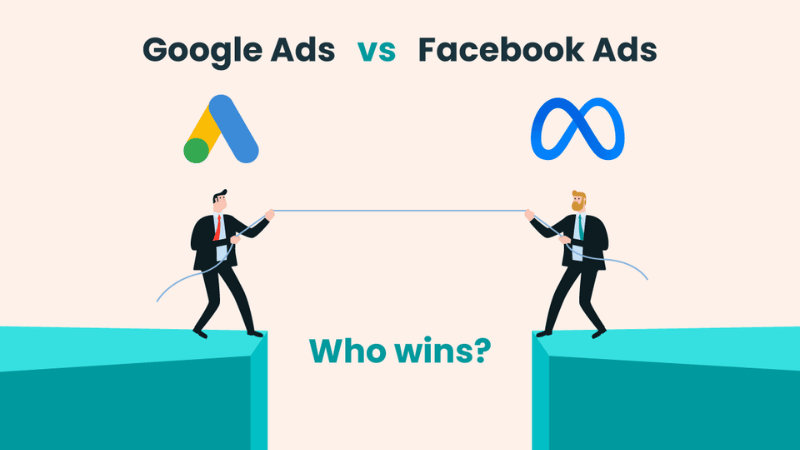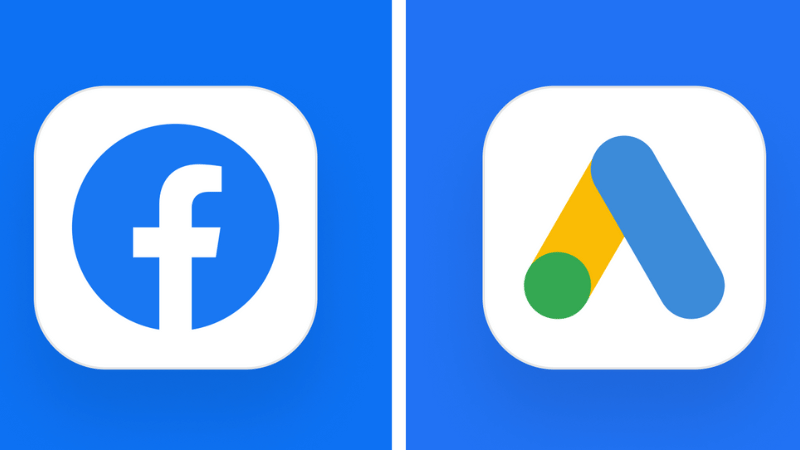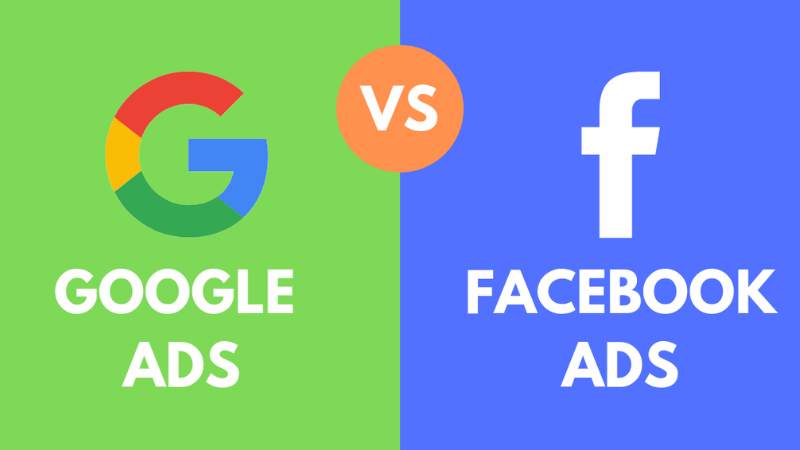The debate of Facebook Ads vs Google Ads has long been a classic showdown in the world of digital marketing, especially for small businesses seeking to optimize costs while still achieving high effectiveness. Both platforms possess unique strengths: Facebook helps you reach customers based on interests and behavior, while Google targets those who are genuinely searching for your product or service. Therefore, choosing between Facebook Ads vs Google Ads is not easy; it depends on specific business goals, budget, and strategy. In this article, we will dissect the differences between these two advertising platforms, understand when to run Facebook, when to invest in Google, and how to combine both to deliver maximum effectiveness for small businesses in 2025.
Deciphering the Facebook Ads vs Google Ads battle
If you run a small business and want to run online advertising, you have certainly heard the names Facebook Ads vs Google Ads at least once. These are not only the two largest advertising platforms on the planet but also the “arena” where marketers have debated for years: which one to choose for better effectiveness, greater cost-efficiency, and more conversions?

What are Facebook Ads?
Facebook Ads is the advertising system of Meta, where you can reach users based on interests, behavior, age, gender, location, etc.—incredibly detailed. Unlike Google, where users actively search, on Facebook, you proactively appear before them. This approach helps small businesses easily reach new potential customers, even if they have never heard of your product. With a massive user base and super-deep targeting capabilities, Facebook Ads is especially effective for products driven by emotion or requiring visual elements, such as fashion, cosmetics, or F&B. However, the downside is that the Facebook algorithm changes continuously, sometimes leading to high ad costs and quick “audience fatigue” if not optimized regularly.
What is Google Ads?
Google Ads (formerly Google AdWords) is the world’s number one search advertising platform, where businesses pay to have their ads appear when users actively type in relevant keywords. For example, if someone searches for “buy cheap sports shoes,” your ad might appear right at the top of the results page. The biggest strength of Google Ads is capturing customers who already have purchase intent; you just need to appear at the right moment to close the sale quickly. Additionally, Google has the Display Network, which allows you to run banners on millions of websites and YouTube. However, the drawback is that the cost is often higher, especially in highly competitive industries, and requires the advertiser to have solid technical knowledge to optimize keywords, Quality Score, and bidding.
Why are these two platforms always compared?
Facebook Ads vs Google Ads are both powerful, but in different ways. For small businesses in 2025, Google Ads is the more effective choice for reaching customers with clear purchase intent—those who are actively searching for a product or service. Meanwhile, Facebook Ads excels at brand awareness and expanding the customer base due to its ability to target deeply by interests, behavior, and demographics. The most optimal strategy is often to combine both platforms: use Facebook Ads to build brand awareness, and then use Google Ads to convert those customers into buyers, creating a complete sales funnel from awareness to action.
The practical pros and cons of each platform
Stepping into the world of digital advertising, small businesses often face the big question: “Should I choose Facebook Ads or Google Ads?” Both platforms are powerful, but they yield different results depending on the business goal. To better understand, let’s analyze the practical pros and cons of each platform to help you determine the most suitable direction for 2025.

Pros – Cons of Facebook Ads
Best suited for: Brand awareness building, community development, and reaching new customer segments or people who might be interested in your product but are not actively searching.
How it works: Target Facebook Ads allows users based on demographics (age, gender, location), interests, behavior, and online activity. This makes it easy for small businesses to “appear” before the right potential customer group without waiting for them to search.
Pros:
- Lower cost: The average Cost Per Click (CPC) for Facebook Ads is generally lower than Google Ads, making it easier for small businesses to start with a modest budget.
- Advanced targeting: You can target extremely detailed criteria—from personal interests and occupation to consumer behavior—far beyond the keyword-only capability of Google.
- Strong brand building: Facebook Ads is the ideal tool for nurturing long-term relationships with customers, increasing brand recognition, and fostering brand loyalty.
Cons:
- Low purchase intent: Most Facebook users are scrolling social media for entertainment, without a clear shopping need. Therefore, the conversion rate may be lower, especially if your product does not create an immediate “wow factor.”
Pros – Cons of Google Ads
Best suited for: Businesses looking to generate leads or sales immediately from people who already know exactly what they need.
How it works: Google Ads targets users based on the keywords they search for on Google, or through other platforms like Gmail, YouTube, and Google’s partner website network. This helps you appear exactly when the customer needs a specific product or service.
Pros:
- High purchase intent: Google users are typically actively searching for a product or solution, so the likelihood of closing a sale is significantly higher.
- Clear measurable effectiveness: Google Ads allows you to track every click, cost, and conversion rate, making it easy to evaluate ROI and optimize campaigns quickly.
Cons:
- Higher cost: Due to fierce competition, especially in industries like travel, education, or e-commerce, the Cost Per Click (CPC) can be significantly higher than Facebook Ads.
- Requires technical expertise: Managing, optimizing keywords, setting bids, and analyzing data requires advanced technical knowledge. Without experience, you can easily spend a lot with disproportionate results.
Which platform to choose for effective advertising?
In reality, the answer lies in what your goal is. If you need immediate sales, Google Ads is the ideal choice because it targets people with genuine demand. If you want to build a brand and attract followers, Facebook Ads is a stronger tool thanks to its broad reach and lower cost.

When to choose Facebook Ads
If your business is in the phase of brand awareness building or just entering the market, Facebook Ads is the perfect choice. This platform helps you reach thousands of users within hours thanks to its ability to target deeply by interests, behavior, age, gender, and geographical location. Crucially, ad costs on Facebook are generally lower than on Google, making it easier to control your budget when starting.
Facebook is also very effective if you want to warm up the customer file—people who don’t know about the product but are likely to be interested. For example, if you sell fashion, cosmetics, or experiential services like spas or cafes, Facebook advertising will help your brand image spread naturally, friendly, and relatable. However, you need to note: Facebook users often don’t have immediate purchase intent, so the ad content must be compelling enough to evoke emotion and leave an impression.
When to choose Google Ads
If you need fast sales, genuine customers, and real demand, then Google Ads is the “ace card.” When users type in search keywords like “buy Samsung phone best price” or “enroll in intensive IELTS course,” they are expressing clear purchase intent, and that is the golden moment for your ad to appear. Google Ads helps businesses reach customers at the final stage of the buyer’s journey, when they are ready to take action.
Furthermore, you can measure effectiveness extremely accurately through click count, cost, and conversion rate. However, Google Ads requires advertisers to have in-depth knowledge of keyword and bidding optimization, as costs can quickly become expensive if set up incorrectly. Nevertheless, for businesses that want clear, measurable results, Google Ads is always a worthwhile investment.
The secret to combining both for explosive results
Instead of choosing one or the other, the smartest strategy in 2025 is to combine both Facebook Ads vs Google Ads. Use Facebook in the initial step to create brand recognition, tell the product story, and attract a potential customer file. Once they know about you, you can use Google Ads to close the deal—retargeting those who are actively searching for related information and are ready to purchase.
2025 Advertising trend – Who will lead the game?
Moving into 2025, as consumers become smarter, online behavior changes constantly, and AI technology advances rapidly, small businesses must adapt or be left behind. The competition between platforms like Facebook Ads and Google Ads is no longer just about budget or ad format, but a race for data, personalization, and speed of adaptation.
Users today are no longer easily fooled by generic advertising. They want to see genuine, relatable content that truly reflects their needs. Instead of just scrolling past pretty pictures, 2025 consumers seek real value, such as authentic reviews, real-life experiences, or useful information. They tend to trust brands that interact positively, respond quickly, and convey a sincere message. Additionally, the shift to mobile devices and short-form social media (like Reels, Shorts, TikTok) means ads must be concise, eye-catching, and personalized more than ever. Therefore, small businesses need to focus on storytelling, UGC (User-Generated Content), and sophisticated remarketing to retain customers long-term.
AI and automation are on the rise
Undoubtedly, AI is the main protagonist of 2025 advertising. From automatically suggesting content and optimizing budgets to personalizing the customer experience in real-time, all are supported by AI. Both Facebook and Google have integrated machine learning to analyze user behavior and propose more optimal campaigns, helping small businesses achieve high effectiveness without needing excessive technical skill. Furthermore, AI chatbot tools and Dynamic Ads are becoming popular trends, allowing brands to communicate, introduce products, and serve customers 24/7. In other words, those who leverage AI sooner will have a superior advantage in reducing costs and increasing conversion efficiency.
Strategic suggestions for small businesses
For small businesses, 2025 is not just a year to “run ads” but a year to build a smart strategy. First, combine both Facebook Ads and Google Ads to create a complete customer funnel. Facebook helps attract and nurture viewers; Google helps close sales when they are ready to buy. Next, don’t overlook customer data—track behavior, run A/B testing, and optimize content based on real insight. Finally, invest in AI tools—from content writing and image design to performance analysis—as these will be the powerful assistants helping you compete with big players who have huge budgets.
Frequently Asked Questions
If the budget is limited, start with Facebook Ads. The reason is that the average Cost Per Click (CPC) of Facebook is typically lower, allowing you to test more ad creatives, targeting, and content for the same amount of money. Facebook is suitable for building brand awareness and “warming up” the customer file. Once you have a sufficient amount of data (e.g., a file of people who have engaged or visited the website), you can move to Google Ads to close sales from those who already have purchase intent. In other words, Facebook helps you “sow the seeds,” and Google helps you “harvest.”
AI can provide strong support, but it cannot fully replace humans. AI tools help automate budget optimization, targeting, and content creation faster, but humans are still needed to guide the strategy, interpret insights, and make creative decisions. In other words, AI is an extremely capable virtual assistant, but you are the one who decides the right direction.